Filter by

Manufacturing Refused Knowledge in the Age of Epistemic Pluralism: Discourses…
- Edition
- -
- ISBN/ISSN
- 978-981-99-7187-9
- Collation
- -
- Series Title
- -
- Call Number
- -
- Edition
- -
- ISBN/ISSN
- 978-981-99-7187-9
- Collation
- -
- Series Title
- -
- Call Number
- -

Migrants, Refugees and Asylum Seekers’ Integration in European Labour Markets
This open access book discusses how, and to what extent, the legal and institutional regimes and the socio-cultural environments of a range of European countries (the Czech Republic, Denmark, Finland, Greece, Italy, Switzerland and the UK), in the framework of EU laws and policies, have a beneficial or negative impact on the effective capacity of these countries to integrate migrants, refugees …
- Edition
- 1
- ISBN/ISSN
- 978-3-030-67284-3
- Collation
- -
- Series Title
- IMISCOE Research Series
- Call Number
- XI, 258

Migrants, Refugees and Asylum Seekers’ Integration in European Labour Markets
This open access book discusses how, and to what extent, the legal and institutional regimes and the socio-cultural environments of a range of European countries (the Czech Republic, Denmark, Finland, Greece, Italy, Switzerland and the UK), in the framework of EU laws and policies, have a beneficial or negative impact on the effective capacity of these countries to integrate migrants, refugees …
- Edition
- -
- ISBN/ISSN
- 978-3-030-67284-3
- Collation
- -
- Series Title
- 10 b/w illustrations
- Call Number
- XI, 258

Primary Physical Science Education
This open access book is the first of two volumes that integrates a study of direct encounters with Primary Forces of Nature, Wind, Light, Rain, Heat and Cold, Water, etc., with imaginative narrative forms of communication. The approach developed in this book shows how the growth of cognitive tools (first of mythic and then of romantic forms of understanding) lets children make sense of expe…
- Edition
- -
- ISBN/ISSN
- 978-3-031-43952-0
- Collation
- XIV, 347
- Series Title
- -
- Call Number
- -
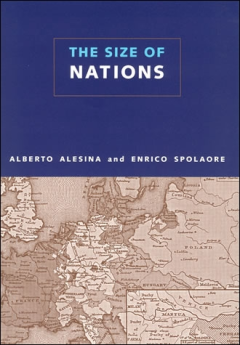
The size of nations
Penulis buku yang tepat waktu dan provokatif ini menggunakan perangkat analisis ekonomi untuk meneliti pembentukan dan perubahan batas politik. Mereka berpendapat bahwa meskipun isu-isu ini selalu menjadi inti analisis historis, para ekonom internasional cenderung menganggap ukuran suatu negara sebagai "eksogen", atau tidak lebih mudah dijelaskan daripada lokasi pegunungan atau aliran sungai. A…
- Edition
- -
- ISBN/ISSN
- 9780262266963
- Collation
- 1 online resource (x, 261 pages)
- Series Title
- Trade & Development
- Call Number
- 304.6 ALE s

Romancero gitano (1924-1927)
- Edition
- -
- ISBN/ISSN
- -
- Collation
- -
- Series Title
- -
- Call Number
- -
- Edition
- -
- ISBN/ISSN
- -
- Collation
- -
- Series Title
- -
- Call Number
- -
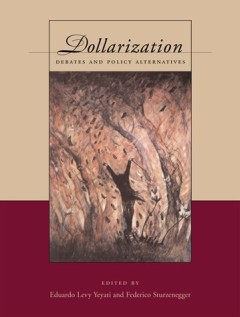
Dollarization: Debates and Policy Alternatives
Theoretical and empirical analysis of de jure dollarization.With the persistent instability of international financial markets, emerging economies are exploring new ways to reduce exposure to capital flow volatility. Some analysts argue that financially open economies are best served by more flexible regimes, while others argue in favor of extreme exchange rate regimes that have a strong commit…
- Edition
- -
- ISBN/ISSN
- 9780262286527
- Collation
- 1 online resource (ix, 341 pages) :illustrations
- Series Title
- -
- Call Number
- -
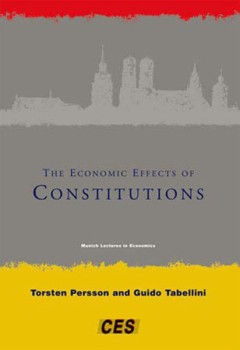
The economic effects of constitutions
"The authors of The Economic Effects of Constitutions use econometric tools to study what they call the "missing link" between constitutional systems and economic policy. Taking recent theoretical work as a point of departure, they ask which theoretical findings are supported and which are contradicted by the facts. The results are based on comparisons of political institutions across countries…
- Edition
- -
- ISBN/ISSN
- 9780262281423
- Collation
- 1 online resource (xiii, 306 pages) :1 map.
- Series Title
- -
- Call Number
- -
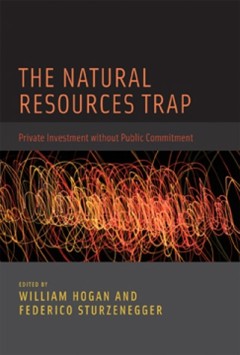
The natural resources trap :private investment without public commitment
Volatility in commodity prices has been accompanied by perpetual renegotiation of contracts between private investors in natural resource production and the governments of states with mineral and energy wealth. When prices skyrocket, governments want a larger share of revenues, sometimes to the point of nationalization or expropriation; when prices fall, larger state participation becomes a bur…
- Edition
- -
- ISBN/ISSN
- 9780262275538
- Collation
- 1 online resource (xiv, 519 pages) :illustrations
- Series Title
- -
- Call Number
- -
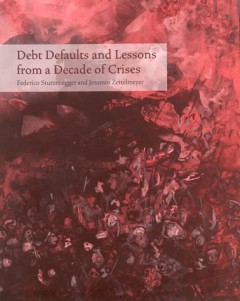
Debt Defaults and Lessons from a Decade of Crises
Providing case studies of debt defaults by Russia, Ukraine, Pakistan, Ecuador, Moldova, and Uruguay, framed by a discussion of the history, economic theory, legal issues, and policy lessons of sovereign debt crises, this work examines the facts, economic theory, and policy implications of sovereign debt crises.OCLC-licensed vendor bibliographic record.
- Edition
- -
- ISBN/ISSN
- 9780262284547
- Collation
- 1 online resource (xii, 385 pages) :illustrations
- Series Title
- -
- Call Number
- -
 Computer Science, Information & General Works
Computer Science, Information & General Works  Philosophy & Psychology
Philosophy & Psychology  Religion
Religion  Social Sciences
Social Sciences  Language
Language  Pure Science
Pure Science  Applied Sciences
Applied Sciences  Art & Recreation
Art & Recreation  Literature
Literature  History & Geography
History & Geography